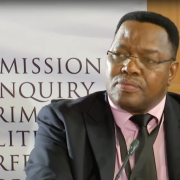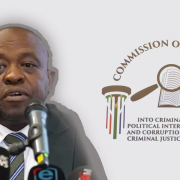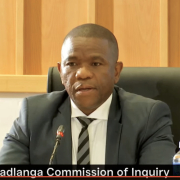|
Getting your Trinity Audio player ready...
|
President Cyril Ramaphosa has gazetted the upcoming Madlanga inquiry into law enforcement corruption. The gazette also includes the terms of reference which lay out the scope of the inquiry, and other regulations which guide its work.
Ramaphosa established the “Judicial Commission of Inquiry into criminality, political interference, and corruption in the Criminal Justice System arising from the specific allegations made public by Lieutenant-General Nhlanhla Mkhwanazi on 6 July 2025, with the terms of reference in the Schedule attached hereto”.
He has officially appointed Acting Deputy Chief Justice Mbuyiseli Madlanga as its chairperson, with Advocate Sesi Baloyi SC and Advocate Sandile Khumalo SC assisting.
Mkhwanazi alleges that a sophisticated criminal syndicate has infiltrated law enforcement and intelligence structures in South Africa. These allegations are not outlandish, nor are they new – as far back as 2019 Corruption Watch and the Institute for Security Studies made a joint submission to the Zondo commission in which they pointed out how manipulation of law enforcement agencies led to impunity for those involved in state capture.
Interference in the police, and the appointment of police leadership without appropriate skills, led to a surge in armed robberies, while mismanagement of criminal justice agencies led to declines in their performance as they became a hostile environment for people committed to the rule of law. Corruption was allowed to proliferate as the capacity to investigate complex commercial crimes was slashed, and the looting of state resources was disregarded so that powerful political factions were protected.
To date, no action has been taken regarding the submission. It has taken the president a further six years to finally commit to an in-depth investigation. In the interim, organised crime has achieved a stranglehold on the country as never before.
“Mkhwanazi alleged that the Minister of Police allegedly interfered with sensitive police investigations and colluded with business people, including a murder accused, to disband the Political Killings Task Team based in KwaZulu-Natal,” said Ramaphosa, addressing the nation on 13 July.
He also alleged that a police investigation by the task team in Gauteng unmasked a syndicate controlled by a drug cartel, which involves politicians, law enforcement officials from the police service and metro police, correctional services, prosecutors and the judiciary, and business people.
“These allegations, if proven true, threaten to undermine the confidence of South Africans in the ability of the South African Police Service to protect them and to effectively fight crime and corruption,” Ramaphosa added.
Meanwhile, on 22 July the Portfolio Committee on Police and the Portfolio Committee on Justice and Constitutional Development adopted a report recommending to the National Assembly (NA) that a multi-party ad hoc committee be established to consider Mkhwanazi’s allegations. The report has been tabled in the NA for consideration.
Wide scope of investigations
The terms of reference state that: “The commission is appointed to investigate and report on the veracity, scope, and extent of the allegations with regard to the infiltration of law enforcement, intelligence, and associated institutions within the criminal justice system by criminal syndicates and make findings and recommendations for criminal prosecutions, disciplinary actions, and institutional reform.”
Hearing dates have not yet been announced.
The commission is authorised to inquire into, report on, and make findings and recommendations concerning:
- Whether criminal syndicates, including but not limited to drug cartels, have infiltrated or exert undue influence over:
- The South African Police Service, including the Political Killings Task Team and Crime Intelligence;
- The Johannesburg Metropolitan Police Department;
- The Ekurhuleni Metropolitan Police Department;
- The Tshwane Metropolitan Police Department;
- The National Prosecuting Authority;
- The State Security Agency;
- Any member of the judiciary, including the magistracy and courts administration;
- The Department of Correctional Services; and
- Any other institutions and/or organs of state within the criminal justice system.
- The nature, extent, and consequences of such infiltration or influence, including:
- The facilitation of organised crime;
- Suppression or manipulation of investigations;
- Inducement of law enforcement leadership into criminal or other unlawful actions, including corruption;
- Commission of any other criminal offences; and
- Intimidation, victimisation, or targeted removal of witnesses, potential witnesses, persons making protected disclosures, or officials resisting criminal influence.
- The role of senior officials of the law enforcement bodies and agencies mentioned above, and of members of the judiciary, including the magistracy, current or former, who may have:
- Aided or abetted the alleged criminal activity;
- Failed to act on credible intelligence or internal warnings; and/or
- Benefited financially or politically from the syndicate’s operations.
- The role of any member of the national executive responsible for the criminal justice system, whether they were complicit, aided and abetted, or participated in the acts listed in the three paragraphs above, or did so by omission.
- The effectiveness or failure of oversight mechanisms.
- The adequacy of current legislation, policies, and institutional arrangements in preventing such infiltration.
- Once established, the commission shall also consider prima facie evidence relating to the involvement of individuals currently employed within law enforcement or intelligence agencies and, where appropriate, the commission must make recommendations regarding the employment status of such officials including whether they should be suspended pending the outcome of further investigations.
The Madlanga commission has been given “all the powers necessary to achieve its mandate”, including:
- The power to summon witnesses and compel the production of documents;
- The power to conduct search and seizure operations, subject to applicable law;
- The power to deviate from the Commissions Act insofar as it provides for public hearings, and to order that the commission shall sit in camera where necessary to protect the safety of witnesses, the integrity of ongoing investigations where appropriate, and where intelligence and the work of intelligence services are concerned; and
- The power to refer matters for immediate criminal investigation and urgent decisions on prosecution, taking into account the nature of the allegations and evidence the commission will uncover.
It has also been mandated to, where appropriate, refer any matter for the convening of a separate enquiry to the appropriate law enforcement agency, government department or regulator.
The commission is required to submit an interim report within three months of its establishment, and a final report within six months of its establishment – or within any extensions granted by the president. Each report must include recommendations that can be immediately actioned based on the commission’s work as of that date.






